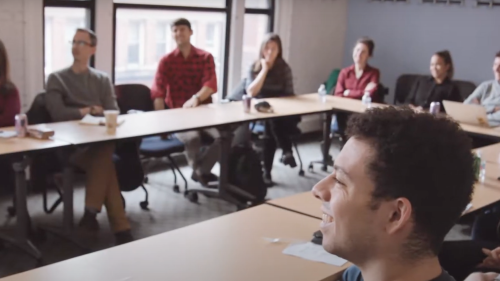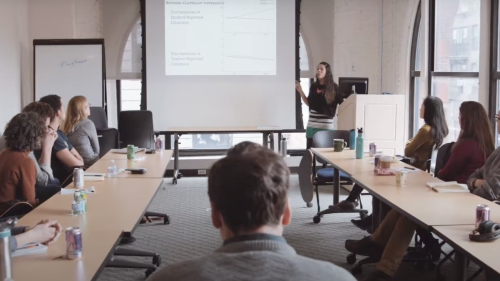Thanks to a long-standing partnership with the Institute of Education Sciences (IES), NYU Steinhardt recipients of the IES-PIRT doctoral fellowship are making a difference in the education industry both through insightful research and on-the-ground impact.
The Institute of Education Sciences-funded Predoctoral Interdisciplinary Research Training (IES-PIRT) program began in 2008 to build a pipeline of researchers, policymakers, and leaders in the education space. The program supports students from a range of interdisciplinary interests with a common theme – benefitting the American education system – through cutting-edge research opportunities, quantitative methodology training, and more.
“The goal is to train doctoral students across multiple disciplines to be leaders in education science,” says Elise Cappella, vice dean for research and co-director of the program. “NYU has sociologists, psychologists, policy researchers, and more who come here to study the major problems in the field of education and to create positive changes to those systems. This program brings them together.”

Participating students come from all over NYU – including multiple departments at Steinhardt, Psychology and Sociology at Arts and Science, and the Wagner School of Public Service. Students collaborate and communicate across disciplinary lines, leading to a more robust understanding of the education landscape and its many interwoven challenges.
Beyond its interdisciplinarity, a hallmark of the IES-PIRT program is its attention to methodological rigor through training in causal inference – or the ability to delve deeply into your data to show exactly what variable created a change during your research.
Maia Connors PhD ’15 (Applied Psychology) was an IES-PIRT fellow in her time at Steinhardt. Now, she is the director of research and policy initiatives for Start Early, a Chicago-based nonprofit that – among other roles – partners at the local, state, and federal levels to ensure programs, policies, and systems put families first.
“The IES-PIRT program was an extraordinary addition to my training...I wouldn’t be the scholar I am today or have the breadth of understanding across disciplines that I do without my time with that great group of people.”
“The fellowship’s emphasis on causal inference and rigorous measurements is really important because it is not common to get that level of quantitative training in the context of doing very applied work or being deeply embedded in research practice partnerships (RPPs),” says Connors. “To have that level of rigor as a researcher is great, but to be able to bring it into the policy space and share it with non-researchers is invaluable.”
This connection to policy and practice is also a critical part of the IES-PIRT program. Fellows undertake an apprenticeship in practice and/or policy at locations – such as the New York City Department of Education, Children's Aid, and New York Immigration Coalition – in which they spend time working on their partner organizations’ real-world problems.
“This apprenticeship piece is what sets us apart and what sets students up for success after graduation,” says Alex Clothier, program manager. “Steinhardt and the IES-PIRT program are training students who are incredibly equipped to tackle pressing education issues for different communities, like students, parents, teachers, administrators, and more.”
IES-PIRT fellow Andrew Weaver is a doctoral student in the Department of Teaching and Learning with a literacy education concentration. Last year, he apprenticed with Good Shepherd Services, a nonprofit guided by social and racial justice that works with communities throughout New York City to help children, youth, and families thrive.
“My experience was an opportunity to work with a great organization and connect with people doing direct service with kids,” says Weaver. “I was able to work on my own research questions, as well as address practical concerns that the organization had about how they were running things. In education research you can sometimes wonder ‘Am I really having an impact in the field?’ With this relationship, I was able to use statistical analysis to ask and consider research questions that really do make a difference.”

Now in its third five-year grant of funding from IES, the IES-PIRT fellowship is also putting a greater emphasis on equity, recruiting primarily from groups underrepresented in the education sciences, including scholars of color, students from low-income families, immigrant origin students, and individuals with disabilities.
This attention to diversity and inclusion goes beyond the researchers themselves to encompass the areas of education they hope to impact. Some recent interest areas include factors affecting literacy development for multilingual children, the relationship between digital inequity and academic outcomes, and the intersection of immigration and education policy.
“The IES-PIRT program was an extraordinary addition to my training,” says Connors. “I wouldn’t be the scholar I am today or have the breadth of understanding across disciplines that I do without my time with that great group of people.”
For the upcoming year, IES-PIRT has recruited nine incoming doctoral students (six from Steinhardt), as well as one advanced fellow, also from Steinhardt.
Learn more about IES-PIRT or about applying for the fellowship.
